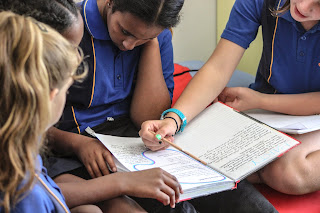Teachers, Teaching and The Writer's Notebook
Importantly, when a student comes to the realisation that their teacher is a writer too, the credibility of the teacher is significantly enhanced. So too is the student's perception of what it means to be someone who writes. When a teacher chooses to portray themselves as someone who chooses to write, writing is more likely to be viewed as having genuine value. Engagement is more likely with teacher buy in.
A priority in the classroom must surely be teachers making their reading and writing lives visible to impressionable students.
The first challenge for teachers who write is to make writing a habit. I once had a teacher say to me, 'Its okay for you Alan, you have time to write.' My response was,' I have no more or less time than anyone else. Like everyone else I have demands on my time that I must attend to in the normal course of the day whether at home or work.'
I make time for writing because it is important in my perception of self as a literate being. Writing is a habit which is formed by repeated efforts.The world is full of writers who also attend to household and family demands. They take out the garbage, sweep the floor. Many read stories to their children and drive their kids to sporting events. At the same time, they quarantine some time for things they consider important or worthy of attention. The time one makes for writing is a reflection the level of seriousness one attaches to it.
As more teachers have begun to write alongside their students, we see an increasing number of teachers adding entries to their writer's notebooks, just as their students do. It is at this point in the process some important question arises. What happens to those entries? What do we do with them? How do we use them to develop our writing lives?
The notebook is the collection space for all those stimulating ideas and thoughts a writer records. But at some point a writer will identify an entry worthy of lifting out of the notebook. An urge develops to expand a particular notebook entry into a writing piece worthy of sharing or publishing. There exists within the writer a desire to shine more light on those raw words. The writer makes a decision. The original entry is examined more closely. It undergoes some re-visioning.
In order for student writers to better understand how this part of the process occurs, they need to see how this task is undertaken by a more proficient writer. So, the challenge for those of us who use a writer's notebook, is to model how this 'lifting out' is done. It is important venture beyond sharing our notebook entries to demonstrate what comes next.
We are therefore challenged to incorporate into our teaching an answer to the provocation- How does a writer expand upon a notebook entry?
Then, we must plan to show the impressionable writer how this all takes place, using our own writing as a model.
The process in action:
 |
| Writer's Notebook Entry: My original thinking |
 |
| A further notebook entry using a listing strategy |
 |
| Final notebook entry with some revisions. This entry was lifted out and further revisions occurred when it was entered into my computer. Then some editing was undertaken and a title was added. |
The journey of this poem from my notebook concluded with its inclusion in my book 'Searching For Hen's Teeth.'
Desmond Dove’s Demise
A child that only a mother could love
Could best describe poor Desmond Dove
With a rough, tough head and hair so woolly
-Desmond was a fearsome bully
Every day around the school
Desmond’s reign was oh so cruel
In line, Des knocked heads together
Before announcing –Boy, aren’t I clever!
He stole food from little kids
Then bopped them with their lunchbox lids
He always pulled on Polly’s hair
And told the teachers- I don’t care!
He teased Elise and made her cry
And squirted mustard in Scott’s eye
He put paint in Hannah’s shoe
And filled Nigel’s pockets up with glue
He throttled Jason, kicked Sheree
He got a stick and whacked Sam’s knee
He stood on Mandy’s chair and broke it
He wrote a rude word –then he spoke it!
But, then he taunted Big Denise…
-And now poor Desmond rests in peace








Comments
Post a Comment